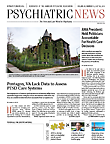More than 100 gene variants have been linked to schizophrenia, Francis McMahon, M.D., chief of the Human Genetics Branch of the National Institute of Mental Health, told Psychiatric News recently, and some gene copy number variations have also been implicated in the illness (Psychiatric News, March 20).
And now still more insights into the genetic aberrations underlying schizophrenia are emerging, according to a report in the May Neuron. The research was conducted by Joseph Gogos, M.D., Ph.D., a professor of neuroscience, physiology, and cellular biophysics at Columbia University, and colleagues.
The researchers used genetic sequencing information from 231 subjects with schizophrenia and their parents, as well as from 34 controls and their parents, to search for gene mutations that might contribute to schizophrenia. The scientists found two mutations in a gene called SETD1A that appeared to contribute to the disorder.
SETD1A makes a protein subunit of an enzyme called histone methyltransferase, which in turn is involved in chromatin regulation. Chromatin is the combination of DNA and proteins that make up the nucleus of a cell, and it engages in several critical operations, such as preventing gene damage and controlling gene expression.
There are “accumulating data indicating a role of chromatin-related genes in various psychiatric and neurodevelopmental disorders,” Gogos and colleagues pointed out.
The researchers found that two of their subjects who had mutations in the SETD1A gene not only had schizophrenia, but also obsessive-compulsive disorder (OCD), suggesting that the mutations might have played a role in both illnesses. Yet whether patients with SETD1A mutations “could define a new clinical subtype of schizophrenia comorbid with OCD symptoms remains to be determined by additional sequencing studies of larger cohorts of both schizophrenia and OCD patients,” the researchers said.
“A clinical implication of [these findings] is the possibility of using the number and severity of mutations involved in chromatin regulation as a way to identify children at risk of developing schizophrenia and other neurodevelopmental disorders,” Gogos said in an accompanying press release. “Exploring ways to reverse alterations in chromatic modification and restore gene expression may be an effective path toward treatment.”
The study was funded by the National Institute of Mental Health, the Lieber Center for Schizophrenia Research at Columbia University, the JSPS Postdoctoral Fellowship for Research Abroad, and the Brain and Behavioral Research Foundation. ■
An abstract of “Loss-of-Function Variants in Schizophrenia Risk and SETD1A as a Candidate Susceptibility Gene” can be accessed
here.
